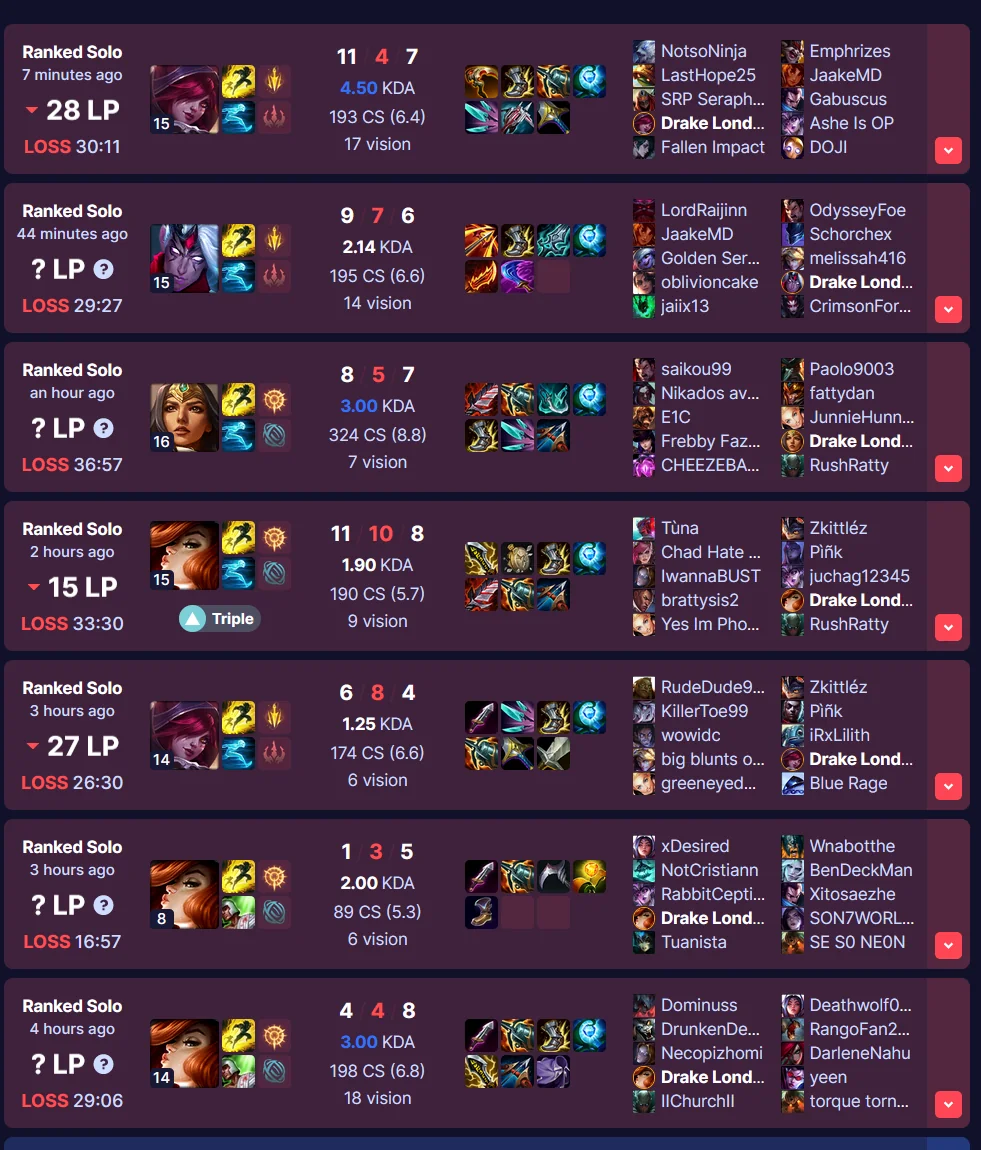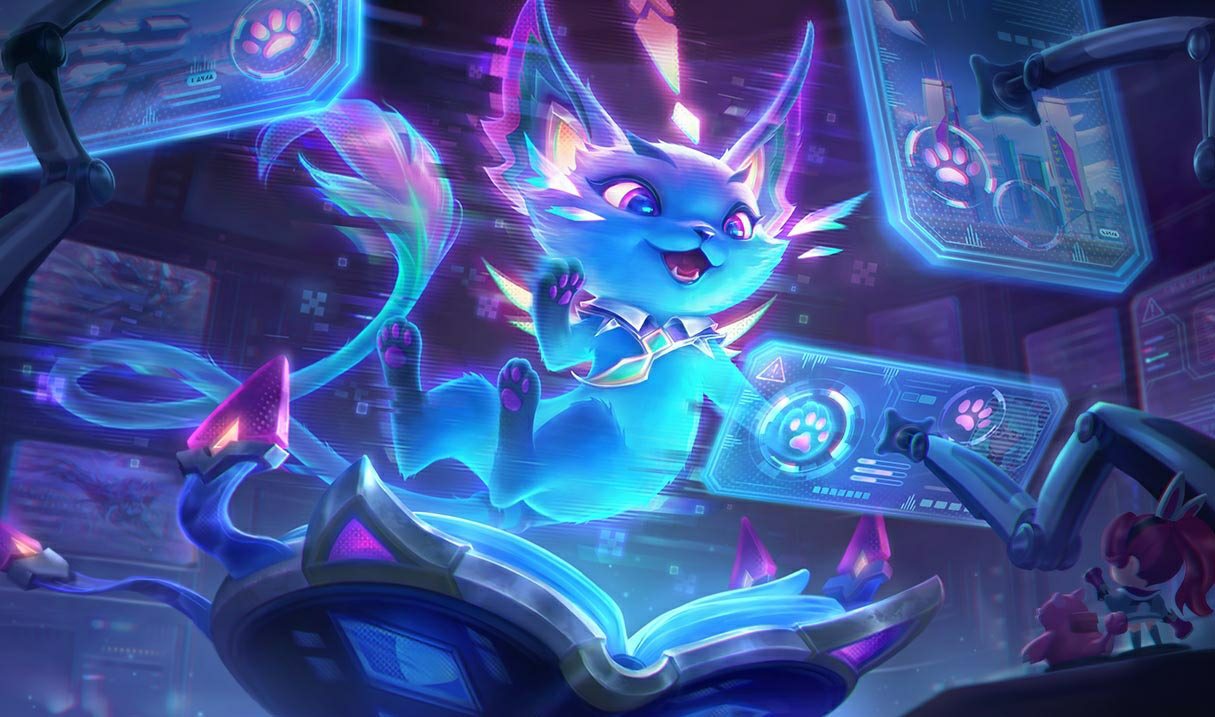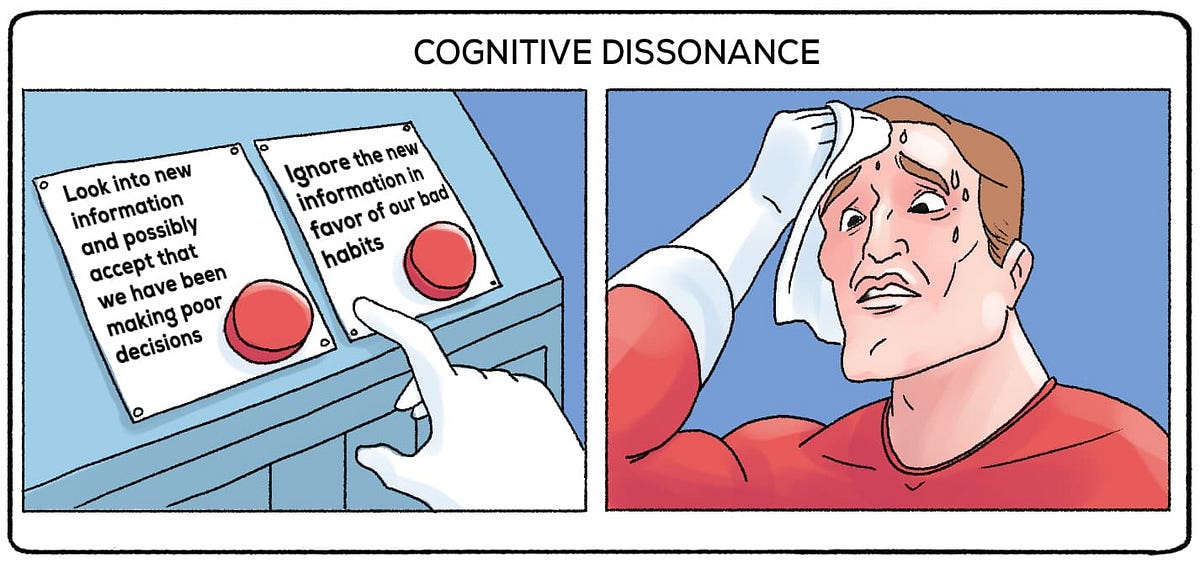Is Losers Queue Real?
“Losers queue” is one of the most talked-about memes in the League of Legends community, having long replaced "elo hell" as a gag. When you're on a win streak, the game starts stacking the odds against you by giving you bad teammates, or stronger opponents.
The sudden drop in winrate is supposed to keep you hooked, playing for longer, coming back for more sessions to try and break out of your rank.
So, is losers queue real? The answer is very simple.
No. It's not.
A lot of players bring it up after a losing streak or a frustrating match. Reddit threads, memes, even streamer rants keep the myth alive, and it’s easy to see why. When games start feeling out of your control, blaming a hidden system feels more comfortable than thinking your gameplay might need work.
But what’s actually going on? Does Riot really have a system that puts you into a queue designed to make you lose? Or is this just another myth that gets stronger every time someone loses three games in a row?
What is the Losers Queue in League of Legends?
The “losers queue” isn’t an official term, and it’s completely different from low priority queue, which is an official term. The belief is that if you win too many games in a row, the matchmaking system will start giving you worse teammates or tougher opponents on purpose. The idea is that the system is trying to force your win rate to stay around 50%. A similar phrase to "losers queue" also includes "enforced 50% wr".

This theory didn’t come from Riot. It grew out of frustration and patterns that seem to happen during losing streaks. You’ll see it brought up all over Reddit, YouTube comments, Twitch chats, and Discord servers. Someone loses three games in a row, and suddenly their teammates can’t farm, their jungler is AFK, and their bot lane is 0/10 at ten minutes every single game.
It feels like the game is working against you. And when it happens often enough, it’s easy to believe something deeper is at play.
Why Do Players Believe in Losers Queue?
People believe in losers queue because it feels real. You win a few games, you're feeling confident—and then suddenly it all crashes. Your teammates seem worse, the enemy laners are smurfing, and the game feels harder for no clear reason. That emotional whiplash sticks with you.
Humans are wired to perceive patterns where there are none, and this is where we tend to form biases.
However, the problem isn’t always the matchmaking. Sometimes it’s
you. After a win streak, players tend to relax or get overconfident. And if you’ve ranked up, you're now facing stronger opponents. What feels like sabotage might just be tougher games—because you're climbing.
There’s also the classic “tilt spiral.” One bad game turns into another, and before you know it, your mental is shot, you're playing worse, and you're blaming the system instead of taking a break.
Different players work differently, depending on circumstances. Some players find it hard to get into long win streaks, because they get overconfident, stop farming and throw. Some others find it hard to go into long loss streaks, because they immediately stop playing for the day when they lose.
How Does Matchmaking Actually Work in LoL?
The matchmaking system in League of Legends is designed to create fair matches based on skill, not to punish or favor anyone.
For a second, try to put yourself in the place of somebody designing the algorithm for matchmaking. How would you be able to possibly enforce a 50% winrate consistently? If you keep shoving random teams from lower elo against high elo opponents, this would mean you're giving easy wins to the other team. Does this mean "winners queue" exists too?
The moment you start thinking about the logistics involved in creating this kind of system, the argument starts to break down.

If you'd like to know more about how the matchmaking algorithm works, be sure to check out our dedicated article on it. In summary, at the center of the system is something called MMR, or matchmaking rating. It's a hidden number that represents your actual skill level, separate from your visible rank.
MMR
Here’s where things get confusing for some players: you might be Gold III on your profile, but the system sees you as playing at a Silver I level behind the scenes. Or vice versa. That’s why sometimes you’ll see weird LP gains to account for these changes.
Your visible rank is more like a badge. Your MMR is what actually controls who you’re queued with. The system that decides your MMR is completely confidential, no matter what MMR checkers may want you to believe.
Whereas your actual rank represents a "hard cap" on who you can be queued up with, MMR represents a softer cap that changes constantly. However, it overall moves slower than rank. The objective for this is to "stabilize" your elo.
If you suddenly jump out of your elo and rank up way too quickly, the system will make climbing numerically harder. It will not queue you with smurfs and onetricks, but it will decrease how much LP you get from wins, slowly decreasing your rank over time until it catches up with your MMR. In the same vein, if a massive loss streak were to kick you down an entire division, your MMR will still pull you upwards until it catches up.
Ranks change in steps, but more quickly than MMR. More importantly, ranks can reset, while MMR never does. The only way to get a "fresh" MMR is buying a fresh Unranked account or levelling up one yourself from scratch. Regardless, once MMR is established, it takes a long time for it to shift.
Performance-Based Factors
Riot has said many times: the system does not look at your in-game stats to decide match quality. So it’s not tracking your KDA or CS score when choosing teammates. It looks at wins and losses. That’s it. You win? Your MMR goes up. You lose? It goes down.
This also means the system doesn’t try to “punish” you for doing well. There’s no special punishment for popping off in a game, or constantly carrying your teammates. If your MMR goes up because of a win streak, the only thing that changes is you start facing better opponents, and you start having better teammates.
Riot Games’ Official Statements
Riot has addressed the "losers queue" myth more than once—and they’ve been pretty clear about it: there’s no system in place that tries to make you lose on purpose.
One Rioter even put it bluntly: “We’re not intentionally putting bad players on your team to make you lose more.” In fact, they point out how illogical that would be. If a player’s on a losing streak, wouldn’t it make more sense to match them with better teammates to help them bounce back and keep playing for longer sessions?
Riot’s developers have explained that the matchmaking system is built entirely around MMR and team balancing. There’s no hidden algorithm that checks your win rate and tries to artificially nudge or adjust it. Instead, if you’re on a streak, your MMR rises, and you get matched with stronger players. That’s it.
They’ve also talked about coaching sessions with players who swear they’re “playing perfectly” but keep losing. In almost every case, a review of their gameplay shows plenty of mistakes and things they could improve. Some mistakes are simply less visible to you than others.
Riot encourages players to focus on learning and improving. They’ve even said a Challenger player could win “unwinnable” games that a mid-rank player might lose. That’s not because the matchmaking is different, it’s because the Challenger consistently makes better decisions.
While Riot isn’t perfect, and matchmaking might not always feel fair, there’s no evidence they’re secretly stacking games against you. A far more likely is confirmation bias.
Confirmation Bias
Let’s be honest, losers queue is probably not real.
What most people call “losers queue” is really just confirmation bias at work. That’s when your brain looks for evidence to support what you already believe, and filters out information that doesn't confirm your beliefs. This is a subconscious process, like most biases. Nobody's saying you're lying through your teeth about losers' queue.
When you lose a few games in a row and your teammates seem bad, your brain confirms this as you being the victim of losers queue. However, when you get free wins because somebody in the enemy team throws or disconnects, it gets brushed off as luck or skill. We tend to ignore matches where we just get dragons for free, which is mostly due to an insane jungle or mid diff that allows you to always have priority for objectives.
This especially happens when we lose games for reasons we don't understand—when we start encountering issues with our play we were not aware of before. This is good. It means your gameplay is improving faster than your understanding of the game.

We tend to agree that generally, if you beat your opponent, it's because you made better decisions. This is why we respect high win rates, and correlate higher ranks with being better at the game. However, when we lose, our subconscious shields us from the unpleasant feeling of being diffed in a videogame. The intensity of this feeling can vary, but it's usually worse if you take particular pride in your performance.
The more self-worth you place onto your own performance, the more you will feel your self-worth threatened by a loss. And when this worldview is challenged, the unease it generates is called cognitive dissonance.
Cognitive Dissonance
When you have two conflicting ideas in your head, or you perform an action that goes against your ideals, your brain feels uncomfortable with that and will do some rather interesting rationalizations to resolve this dissonance.
Let’s say you believe you’re a good player. You’ve had solid KDAs, a high win streak, and you’re confident in your mechanics. Then suddenly, you start losing game after game, almost inexplicably. Your team starts losing fights halfway across the map, and you can never get to a position where you can pressure the map elsewhere. Enemies start to snowball too easily, your teammates don't follow your calls, they don't establish prio to help you further the map and don't want to do objectives.
That reality doesn’t line up with your belief. And instead of thinking, “Maybe I still have things to work on”, your brain tries to resolve the tension another way: “Riot is putting me in losers queue”.

It’s easier to believe the system is flawed than to accept that you might be making mistakes—or that your opponents are simply better than you. A meaningful amount of our brains’ processing power and calories go towards resolving these small inconsistencies. It prefers to confirm our beliefs or think of reasonable explanations that do not damage our self-image, rather than confront the unknown.
A helpful exercise to get rid of this dissonance, is to watch replays and focus on the game from the perspective of your teammates. A play that, to you, looks like your team inting in a 4v5 for a hopeless baron instead of farming and clearing waves, could have actually been a game-winning fight you were not present for.
A jungler that cannot ever get a dragon could have been a jungler that never had priority from mid and botlane when they needed it. A botlane constantly getting double-killed could have been a duo constantly turtling under their turret and struggling to farm while a Caitlyn and Xerath duo chunked them under tower seconds after they got to lane.
Escaping Losers Queue
Okay, so the losers queue probably isn’t real—but the feeling of being stuck definitely is, and it is completely valid. You’re not imagining that frustration, and the good news is: there are things you can do to break out of a slump. Here’s how to bounce back when ranked starts to dig into your brain.
1. Focus on Yourself
Climbing in League isn’t about avoiding losses, it’s about winning more over time. Instead of chasing hot streaks, aim for consistent, solid play. Focus on what you can control: your own gameplay. Focus on your own gameplay and aim to hit good personal performance.
2. Take a Break After Tilt
If you lose two or three in a row and start feeling tilted, stop playing. Tilt leads to bad decisions, and those games often spiral into more losses. Take a walk, watch a stream, or just log off for the day. Play a single-player game, or hang out in a non gaming-related space.
3. Review Your Games
Not just the ones you lost, but the ones you won too. Ask yourself:
- What could I have done better before this death?
- Was I playing around objectives properly?
- Did I miss a roam that could have helped?
Chances are, there are small mistakes that add up. Fixing just one or two of them can completely change your games.
It might feel like a large time investment, but replays are pretty easy to record nowadays. Check out our quick guide on replays and get a recording in less than 5 minutes. Then, you can spend another 5 minutes watching the game on fast-forward. Are you constantly pushing for no good reason? Does your lane seem extremely gankable to the enemy jungler? Did you seem like you just weren't rotating to your own jungler?
4. Treat It Like Practice
Think of each game as practice—not a win-or-lose verdict on your worth. If you see each match as a chance to improve something—wave management, jungle tracking, map awareness—you’ll get better. And that progress leads to wins.
Conclusion
So, is the losers queue real?
No. Not in the way people think. Riot doesn’t have a hidden system designed to make you lose. There’s no switch that gets flipped after three wins to throw you into elo hell. What is real is how easy it is to feel stuck, frustrated, or convinced the game is working against you.
Blaming the system feels good in the short term, but it's a trick our brains play on ourselves.
Next time you hit a rough patch, don’t default to “losers queue.” Instead, pause. Ask yourself what you could do differently. Review your games. Take breaks. And keep showing up with the mindset that you are in control of your climb.
Because you are.





